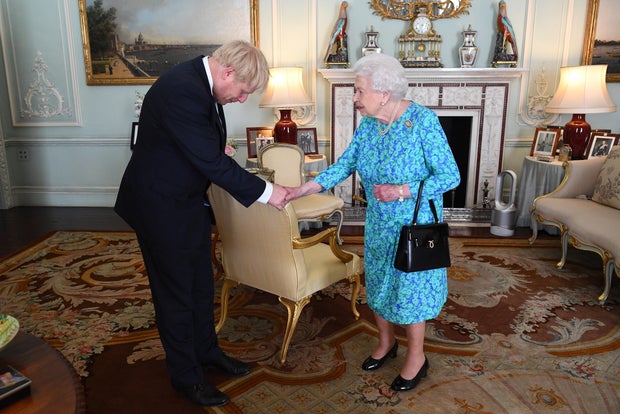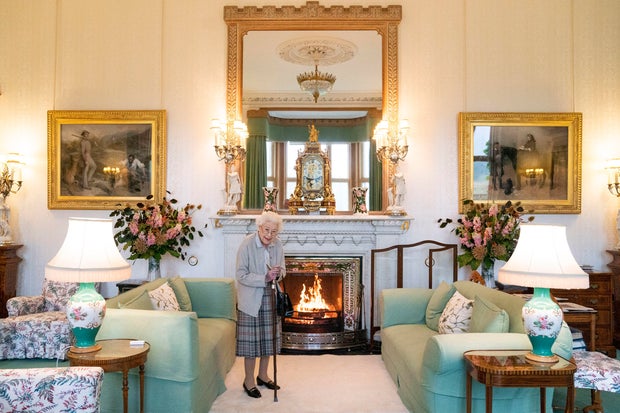CBS News
Former U.K. Prime Minister Boris Johnson claims late Queen Elizabeth II had bone cancer

Former British Prime Minister Boris Johnson claims in his soon-to-be released memoir that Queen Elizabeth II was diagnosed with bone cancer before her death in September 2022 at the age of 96. His assertion represents a significant break with royal protocol between the prime minister’s office and Buckingham Palace, under which the U.K.’s elected leaders generally keep the royal family’s private matter to themselves.
Johnson makes the claim in his upcoming memoir, “Unleashed,” which is scheduled for release later in October. An excerpt from the book, with the purported detail about the late queen’s health, was published this week in Johnson’s regular column for the Daily Mail newspaper.
No senior British government official or member of the royal family has previously disclosed any detail about the late queen’s cause of death. An official death certificate published a week after Queen Elizabeth died listed the cause of death as “old age.”
PA/Victoria Jones
“I had known for a year or more that she had a form of bone cancer, and her doctors were worried that at any time she could enter a sharp decline,” Johnson says in his book. “She seemed pale and more stooped, and she had dark bruising on her hands and wrists, probably from drips or injections.'”
Although he said the queen seemed to be ailing, Johnson said she was still sharp in his final meeting with her.
“Her mind… was completely unimpaired,” he writes. “She still flashed that great white smile in its sudden mood-lifting beauty.”
Johnson who served as the U.K. prime minister between 2019 and 2022, met with Elizabeth just days before she died at her Scottish residence, Balmoral Castle, to hand her his formal resignation as the country’s leader.
JANE BARLOW/POOL/AFP/Getty
Buckingham Palace declined to comment when asked by CBS News about Johnson’s claim. The palace typically does not comment on claims about the private lives of royal family members in books or print.
While Johnson’s remarks break with the long-time tradition of U.K. prime ministers not commenting publicly on what’s said during private meetings with royal family members, they are not entirely unprecedented.
In 2014, then-Prime Minister David Cameron apologized to Queen Elizabeth for disclosing details of a private conversation with her about the results of a referendum in which Scots rejected the idea of Scotland’s secession from the United Kingdom to become an independent state.
Cameron had been overheard telling former New York Mayor Michael Bloomberg the monarch appeared relieved that the Scots had voted in favor of remaining in the U.K., suggesting the late queen had “purred down the line” after the final results.
Former British leaders Tony Blair and Gordon Brown have also given some detail of conversations and interactions they had with Queen Elizabeth in books about their time in office.
Elizabeth’s first son, who became King Charles III upon her death, broke with the long-standing precedent of not revealing personal royal health news earlier this year, when Buckingham Palace revealed that he was being treated for cancer, though the palace has not reveal what type of cancer he’s being treated for.
A month after the revelation about the monarch’s health trouble, his daughter-in-law Catherine, the Princess of Wales, revealed her own cancer diagnosis. Princess Kate said in September that she had completed her treatment, but that her “path to healing” would be long.
CBS News
Biden’s top hostage envoy Roger Carstens in Syria to ask for help in finding Austin Tice

Roger Carstens, the Biden administration’s top official for freeing Americans held overseas, on Friday arrived in Damascus, Syria, for a high-risk mission: making the first known face-to-face contact with the caretaker government and asking for help finding missing American journalist Austin Tice.
Tice was kidnapped in Syria 12 years ago during the civil war and brutal reign of now-deposed Syrian dictator Bashar al-Assad. For years, U.S. officials have said they do not know with certainty whether Tice is still alive, where he is being held or by whom.
The State Department’s top diplomat for the Middle East, Barbara Leaf, assistant secretary of state for Near Eastern Affairs, accompanied Carstens to Damascus as a gesture of broader outreach to Hay’at Tahrir al-Sham, known as HTS, the rebel group that recently overthrew Assad’s regime and is emerging as a leading power.
Near East Senior Adviser Daniel Rubinstein was also with the delegation. They are the first American diplomats to visit Damascus in over a decade, according to a State Department spokesperson.
They plan to meet with HTS representatives to discuss transition principles endorsed by the U.S. and regional partners in Aqaba, Jordan, the spokesperson said. Secretary of State Antony Blinken traveled to Aqaba last week to meet with Middle East leaders and discuss the situation in Syria.
While finding and freeing Tice and other American citizens who disappeared under the Assad regime is the ultimate goal, U.S. officials are downplaying expectations of a breakthrough on this trip. Multiple sources told CBS News that Carstens and Leaf’s intent is to convey U.S. interests to senior HTS leaders, and learn anything they can about Tice.
Rubinstein will lead the U.S. diplomacy in Syria, engaging directly with the Syrian people and key parties in Syria, the State Department spokesperson added.
Diplomatic outreach to HTS comes in a volatile, war-torn region at an uncertain moment. Two sources even compared the potential danger to the expeditionary diplomacy practiced by the late U.S. Ambassador Christopher Stevens, who led outreach to rebels in Benghazi, Libya, in 2012 and was killed in a terrorist attack on a U.S. diplomatic compound and intelligence post.
U.S. special operations forces known as JSOC provided security for the delegation as they traveled by vehicle across the Jordanian border and on the road to Damascus. The convoy was given assurances by HTS that it would be granted safe passage while in Syria, but there remains a threat of attacks by other terrorist groups, including ISIS.
CBS News withheld publication of this story for security concerns at the State Department’s request.
Sending high-level American diplomats to Damascus represents a significant step in reopening U.S.-Syria relations following the fall of the Assad regime less than two weeks ago. Operations at the U.S. embassy in Damascus have been suspended since 2012, shortly after the Assad regime brutally repressed an uprising that became a 14-year civil war and spawned 13 million Syrians to flee the country in one of the largest humanitarian disasters in the world.
The U.S. formally designated HTS, which had ties to al Qaeda, as a foreign terrorist organization in 2018. Its leader, Mohammed al Jolani, was designated as a terrorist by the US in 2013 and prior to that served time in a US prison in Iraq.
Since toppling Assad, HTS has publicly signaled interest in a new more moderate trajectory. Al Jolani even shed his nom de guerre and now uses his legal name, Ahmed al-Sharaa.
U.S. sanctions on HTS linked to those terrorist designations complicate outreach somewhat, but they haven’t prevented American officials from making direct contact with HTS at the direction of President Biden. Blinken recently confirmed that U.S. officials were in touch with HTS representatives prior to Carstens and Leaf’s visit.
“We’ve heard positive statements coming from Mr. Jolani, the leader of HTS,” Blinken told Bloomberg News on Thursday. “But what everyone is focused on is what’s actually happening on the ground, what are they doing? Are they working to build a transition in Syria that brings everyone in?”
In that same interview, Blinken also seemed to dangle the possibility that the U.S. could help lift sanctions on HTS and its leader imposed by the United Nations, if HTS builds what he called an inclusive nonsectarian government and eventually holds elections. The Biden administration is not expected to lift the U.S. terrorist designation before the end of the president’s term on January 20th.
Pentagon spokesperson Pat Ryder disclosed Thursday that the U.S. currently has approximately 2,000 US troops inside of Syria as part of the mission to defeat ISIS, a far higher number than the 900 troops the Biden administration had previously acknowledged. There are at least five U.S. military bases in the north and south of the country.
The Biden administration is concerned that thousands of ISIS prisoners held at a camp known as al-Hol could be freed. It is currently guarded by the Syrian Democratic forces, Kurdish allies of the U.S. who are wary of the newly-powerful HTS. The situation on the ground is rapidly changing since Russia and Iran withdrew military support from the Assad regime, which has reset the balance of power. Turkey, which has been a sometimes problematic U.S. ally, has been a conduit to HTS and is emerging as a power broker.
A high-risk mission like this is unusual for the typically risk averse Biden administration, which has exercised consistently restrained diplomacy. Blinken approved Carstens and Leaf’s trip and relevant congressional leaders were briefed on it days ago.
“I think it’s important to have direct communication, it’s important to speak as clearly as possible, to listen, to make sure that we understand as best we can where they’re going and where they want to go,” Blinken said Thursday.
At a news conference in Moscow Thursday, Russian President Vladimir Putin said he had not yet met with Assad, who fled to Russia when his regime fell earlier this month. Putin added that he would ask Assad about Austin Tice when they do meet.
Tice, a Marine Corps veteran, worked for multiple news organizations including CBS News.
CBS News
12/19: CBS Evening News – CBS News

Watch CBS News
Be the first to know
Get browser notifications for breaking news, live events, and exclusive reporting.
CBS News
Delivering Tomorrow: talabat’s Evolution in the Middle East

Watch CBS News
Be the first to know
Get browser notifications for breaking news, live events, and exclusive reporting.










